人教版八年级英语上册教案
【教案】新版人教版八年级上册英语教案

【教案】新版人教版八年级上册英语教案第一课时教学目标1. 研究询问别人的姓名和年龄的表达方式并能够流利运用。
2. 掌握数字 one 到 twenty 的发音和英语书写形式。
3. 培养学生的口语表达能力和自信心。
教学重点1. 询问别人的姓名和年龄的表达方式。
2. 数字 one 到 twenty 的发音和英语书写形式。
教学难点1. 如何帮助学生提高口语表达能力。
教学过程1. Warming-up利用图片或教具,引入数字 one 到 twenty。
2. Presentation根据教材第一页的内容,介绍如何询问对方姓名和年龄,帮助学生了解常见的礼貌用语,例如 excuse me,What's your name? 和How old are you? 等。
3. Practice3.1 学生两人一组进行练,模拟真实场景,询问对方姓名和年龄,并记录下来。
3.2 学生分组进行数字 one 到 twenty 的听说练,教师检查每组的发音和读音。
4. Production4.1 学生分组进行对话,可以创造自己的场景并使用所学的语言进行对话练。
4.2 教师抽取三名同学进行 oral presentation,检查学生口语表达能力。
作业完成教材第二页的练。
教学反思本节课教学重点是询问别人的姓名和年龄的表达方式并能够流利运用,以及数字 one 到 twenty 的发音和英语书写形式。
通过多种形式的练习,帮助学生提高口语表达能力。
教学效果良好,但在课堂上发现学生们的英语基础参差不齐,因此需要针对不同学生制定个性化的教学计划。
八年级上册英语教案 人教版八年级英语教案

八年级上册英语教案人教版八年级英语教案【篇一】八年级上册英语教案2022年新目标英语八年级上全册教案2022年下期八年级英语全册教案(人教版)Unit 1 Where did you go on vacation?Section A 1 (1a-2d)一、教学目标:1. 语言知识目标:1) 能掌握以下单词:anyone, anywhere, wonderful, quite a few, most, something, nothing, everyone, of course, myself, yourself能掌握以下句型:① —Where did you go on vacation? —I went to the mountains.② —Where did Tina to on vacation? —She went to the beach.③ —Did you go with anyone?2) 能了解以下语法:—复合不定代词someone, anyone, something, anything等的用法。
—yourself, myself等反身代词的用法。
3)一般过去时态的特殊疑问句,一般疑问句及其肯定、否定回答。
2. 情感态度价值观目标:学会用一般过去时进行信息交流,培养学生的环保意识,热爱大自然。
二、教学重难点1. 教学重点:1) 用所学的功能语言交流假期去了什么旅行。
2) 掌握本课时出现的新词汇。
2. 教学难点:1) 复合不定代词someone, anyone, something, anything等的用法。
2) yourself, myself等反身代词的用法。
三、教学过程Ⅰ. Lead-in1. 看动画片来进入本课时的主题谈论上周末做了些什么事情,谈论过去发生的事情。
Ⅱ. Presentation1. Show some pictures on the big screen. Let Ss read the expressions.2. Focus attention on the picture. Ask: What can you see? Say: Each picture shows —Yes, I did./No, I didn’t.something a person did in the past. Name each activity and ask students to repeat: Stayed at home, Went to mountains, went to New York City 6. Went to the beach, visited my uncle, visited museums, went to summer camp3. Now, please match each phrase with one of the pictures next to the name of the activity,point to the sample answer.4. Check the answers. Answers: 1. f 2. b 3. g 4. e5. c6. a7. d III. Listening1. Point to the picture on the screen.Say: Look at the picture A. Where did Tina go on vacation? She went to mountains. Ask: What did the person do in each picture?2. Play the recording the first time.3. Play the recording a second time.Say: There are three conversations. The people talk about what did on vacation. Listen to the recording and write numbers of the namesin the right boxes of the picture.4. Check the answers.IV.Pair work1. Point out the sample conversation. Ask two Ss to read the conversation to the class.2. Now work with a partner. Make your own conversation about the people in the picture.3. Ss work in pairs. As they talk, move around the classroom and give any help they need.4. Let some pairs act out their conversations.V. Listening1. Tell Ss they will hear a conversation about three students’ conversations. Listen for the first time and fill in the chart. Then listen again and check Yes, or No.2. Let Ss read the phrases in the chart of 2b.3. Play the recording the first time. Ss listen and fill in the chart.4. Play the recording a second time for the Ss to check “Yes, I did.” or “No, I didn’t. ”5. Check the answers with the Ss.VI. Pair work1. Let two Ss read the conversation between Grace, Kevin and Julie.2. Let Ss work in pairs and try to role-play the conversation.3. Ask some pairs to act out their conversations.VII. Role-play1. First let Ss read the conversation and match the people and places they went.2. Let Ss act out the conversations in pairs.3. Some explanations in 2d.Homework:用英语询问你的一位好朋友,她(他)假期去了哪里?看到了什么?并将此对话写在作业上。
人教版八年级英语上册全册教案(超详细)
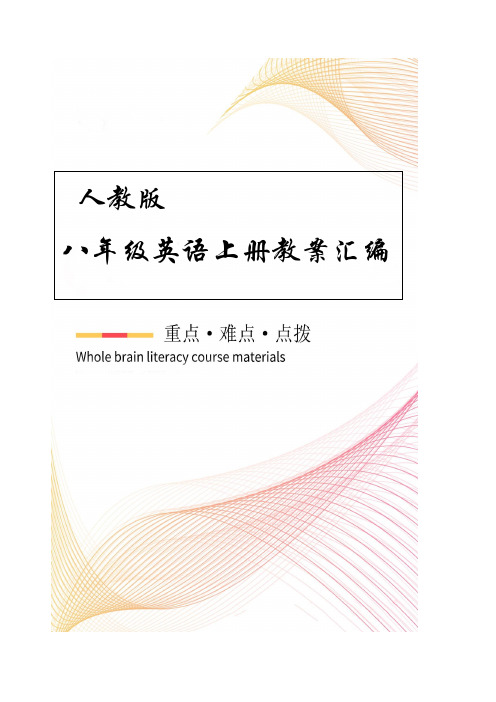
人教版八年级英语上册教案汇编Unit 1Where did you go on vacation?本单元教材以Where did you go on vacation?为中心话题,围绕着描述“过去发生的事情”展开,学习和运用一般过去时态的一般疑问句Did you go/see/buy...?和特殊疑问句Where/What/How...?询问过去的事件,让学生学会谈论和分享过去发生的事件。
本课教学内容与学生的实际生活密切相关,易于引发学生运用简单的英语进行交流。
在学习活动中,学生通过交换对过去发生的事情的描述及看法,促进学生之间和师生之间的情感交流,增进情谊。
Section A的主要学习内容是:复习一般过去时态和动词的规则与不规则变化,学习一般过去时态的一般疑问句:Did you...?及不定代词的用法。
Section B安排了许多听、说、读、写的任务活动,教师在教学中可以灵活运用这些活动,将其中的一些活动进行变化或整合,充分调动学生参与的积极性,提高学生的听说读写能力。
第一课时Section A(1a-2d)Teaching Goals【教学目标】Key words & phrases:anyone,anywhere,wonderful,few,most,quite a few,go on vacationKey sentences:1.Where did you go on vacation?I went to the mountains/New York City/summer camp/the beach.2.Did you...?Yes,I did./No,I didn't.Teaching Key Points【教学重点】The vocabulary:New York City,Central Park,few,most,quite a few,on vacationTarget language:Where did you/they/he/she go on vacation?I/They/He/She went to the mountains/New York City/summer camp/the beach. Did you...?Yes,I did./No,I didn't.Teaching Difficult Points【教学难点】Use the target language above to talk about past events.Teaching Aids【教学工具】An English textbook,a tape recorder,CAI or courseware.Teaching Steps【教学过程】★Step 1Leading inGreet the class and introduce what to learn in this period.Teacher:Welcome back to school!Did everyone have a good time during the summer vacation?Today we'll begin to learn the topic where you went on vacation.Teacher:Where did you go on vacation?Students:______.①I went to the mountains.②I visited museums.…★Step 2Pre-taskPage 1,1a & 1b.1.Look at the picture.2.Match each activity.3.Check the answers in 1b.4.Practice reading.Page 1,1c.1.Focus on the conversation in the box.2.Practice reading.3.Pairwork:Where did you go on vacation?I...4.Groupwork:Divide the class into groups of four or five. Make conversations.First S1 to S2:S1:Where did you go on vacation?S2:I...S1:Where did she/he go on vacation?S2:She/He...★Step 3While-taskPage 2,2a & 2b.1.Play the recording for the first time. Students complete the chart in 2a.2.Check the answers.(Point to one student who raises his or her hand.)3.Play the recording a second time and say:There are three conversations. The people talk about where they went on vacation. Listen to the recording and check(√)Yes,I did or No,I didn't for each question.4.Correct the answers.★Step 4Post-taskPage 2,2c & 2d.1.Focus on the conversation in 2c & 2d.2.Practice reading. Make students scan the conversations first.3.Teach and then make students role-play the conversation in pairs.4.Have a group of students present their conversation to the class.★Step 5Homework1.Practice the conversation on Page 2,2d.2.Do the exercises on Page 1 in students' book.Board Design板书设计Unit 1Where did you go on vacation?The first period Section A(1a-2d)1.Key vocabulary:anyone,anywhere,wonderful,quite a few,go on vacation 2.Target language:A:Where did Tina go on vacation?B:She went to the mountains.第二课时Section A(GF-3c)Teaching Goals【教学目标】Key words:something,nothing,everyone,myself,yourself,someone,seem,bored,diaryKey phrases:go out,have a good time,of course,keep a diaryKey sentences:1.Where did you go on vacation?I went to New York City.2.Did you go out with anyone?Did you buy anything special?3.How was the food?How was your vacation?Teaching Key Points【教学重点】The vocabulary:something,nothing,everyone,myself,yourself,someone,seem,bored,diary,go out,have a good time,of course,keep a diary,on vacation Target language:How was the food?Everything tasted really good!Did you go shopping?Of course!Did everyone have a good time?Oh,yes. Everything was excellent.Teaching Difficult Points【教学难点】e the target language above to talk about past events.2.The usage of someone,anyone,everyone,no one,something,anything,everything,nothing.Teaching Aids【教学工具】An English textbook,CAI or courseware.Teaching Steps【教学过程】★Step 1Leading in(T—teacher S—student)T:Where did you go last weekend?S:I went to the beach.T:Did you go there with anyone?S:Yes. I went to the beach with my brother.T:Did you have a good time there?S:...★Step 2Pre-taskPage 3,Grammar Focus.1.Review the grammar box. Work in pairs. One asks and the other answers.2.Practice reading the sentences in the chart.★Step 3While-taskPage 3,3a & 3b.1.Teach these new words:anyone,something,anything,everything,nothing,everyone,no one.2.Call students' attention to the conversation in 3a. Make students complete it individually.3.Choose a student to give his or her answers. Write the answers on the board.4.Correct the answers.5.Lead students to read this conversation.6.Have students work in pairs and role-play the conversation. As they talk,move around the classroom monitoring their work. Offer language or pronunciation support as needed.7.Make students complete the blanks in the e-mail message in 3b with the words in the box.8.Check the answers and then make students practice reading it.★Step 4Post-taskPage 3,3c.Complete the task in 3c.Ask your group questions about their last vacation. Then tell the class your results.★Step 5Homework1.Review the indefinite pronouns learned in this period.2.Do the exercises on Page 2 in students' book.Board Design板书设计Unit 1Where did you go on vacation?The second period Section A(GF-3c)1.The vocabulary:something,nothing,everyone,someone,myself,yourself,go out,of course2.Target language:①A:Where did you go on vacation?B:I went to New York City.②A:Did you buy anything special?B:Yes,I bought something for my father.3.Structure:something special4.Answers to 3a and 3b.第三课时Section B(1a-1e)Teaching Goals【教学目标】Key words:delicious,exciting,terrible,expensive,cheap,boringKey sentences:1.Where did Lisa go on vacation?2.Did she do anything special there?Did she buy anything for her best friend?Did Lisa like her vacation?3.How was/were...?Teaching Key Points【教学重点】The vocabulary:delicious,exciting,terrible,expensive,cheap,boringTarget language:Where did Lisa go on vacation?Did she do anything special there?Did she buy anything for her best friend?How was/were...?Teaching Difficult Points【教学难点】1.询问去过何地以及感受(评价)Where did you go?I went to the beaches. How was it?It was exciting.2.Use the target language to talk about your past events.Teaching Aids【教学工具】An English textbook,a tape recorder,CAI or courseware.Teaching Steps【教学过程】★Step 1Leading in1.Greetings.2.T:Where did you go on vacation?S:I went to summer camp.T:Did you do anything special there?S:Yes,I...T:Did you buy anything for your parents or friends?S:Yes,I bought...for.../No,I bought nothing.T:How was/were...?S:It was/They were...★Step 2Pre-taskPage 4,1a & 1b.1.Look at the six pictures.2.Match the words with the pictures.3.Students complete the task in 1b individually.4.Check the answers.★Step 3While-taskPage 4,1c & 1d.1.Make students scan the questions in 1c.2.Play the recording for the first time. And say:Listen to the tape. Lisa is talking about her vacation. Complete the four questions.3.Play the recording a second time. Students complete the task in 1d.4.Correct the answers.★Step 4Post-taskPage 4,1e.Ask 3 or 4 students to answer questions about Lisa's vacation. You can begin your questions with:Where did...?What did...?Did she...?How was...?How were...?★Step 5Homework1.Review these sentences:Where did...?Did...?How was/were...?2.Do the exercises on Page 3 in students' book.Board Design板书设计Unit 1Where did you go on vacation?The third period Section B(1a-1e)1.Words:delicious,exciting,terrible,expensive,cheap,boring2.Sentences:①Where did Lisa go on vacation?②Did she buy anything special?③Did she buy anything for her best friend?④Did Lisa like her vacation?3.Answers to Activity 1a:1—5f a c e b dAnswers to Activity 1b:wordsdeliciousexcitingcheapwordsterribleexpensiveboring第四课时Section B(2a-2e)Teaching Goals【教学目标】Key words:activity,decide,try,bird,bicycle,building,trader,wonder,difference,top,wait,umbrella,wet,below,enough,hungry,asKey phrases:feel like,because of,go to the beach,a lot of,a little,take the train,too many,what aboutKey sentences:1.I wonder what life was like here in the past.2.What a difference a day makes!3.We waited over an hour for the train because there were too many people.Teaching Key Points【教学重点】Learn Jane's diary entries about her vacation.1.The vocabulary:activity,decide,try,wonder,difference,wait,below,enough,hungry,as,feel like,because of2.Target language:I wonder what life was like here in the past. We waited over an hour for the train because there were too many people.Teaching Difficult Points【教学难点】1.because and because of2.What a difference a day makes!3.Learn to write a diary.Teaching Aids【教学工具】An English textbook,CAI or courseware.Teaching Steps【教学过程】★Step 1Leading in1.Greetings.2.Introduce what to learn in this period,especially the articles in 2b,Jane's diary entries. Teacher begins like this:Today we'll focus on two diary entries about Jane's vacation. Through the learning you'll know how to write a diary. Let's begin now.★Step 2Pre-taskPage 5,2a & 2b.1.Review and discuss the questions in 2a box with your partner.2.Project these new words on the screen or write them on the board and teach the new words. Ask students to repeat them. And make sure everyone knows the meanings.activity n.活动;decide v.决定;try v. & n.尝试,设法;wonder v.想知道;difference n.差异;top n.顶部;wait v. & n.等待;umbrella n.伞;below prep.& adv.在……下面;enough adj.充足的;hungry adj.饥饿的3.Make students scan the articles first. Ask students to put a mark in contents that are unfamiliar to them. Then the teacher lead students to learn these two articles sentence by sentence. Pay attention to these points:(1)decide v.决定;decide to do sth.决定做某事;(2)try v.尝试;try doing sth.尝试做某事;try to do sth.尽力做某事;(3)below prep. & adv.在……下面;(4)feel like 给……的感觉;(5)because and because of;(6)wonder v.想知道4.Practice reading.★Step 3While-taskPage 6,2c & 2d.1.Make students read Jane's diary entries again. Fill in the chart in 2c.2.Students complete the conversation in 2d using the information in Jane's dairy entries.3.Choose 3 or 4 students to give their answers.4.Correct the answers.5.Have students work in pairs. Student A will be Anna and student B will be Jane. Act the conversation out.★Step 4Post-taskPage 6,2e.1.Make students complete the blanks in 2e.2.Ask one student to write his or her answers on the board.3.Check the answers together with the class.4.Practice reading.★Step 5Homework1.Write a diary.2.Do the exercises on Page 4 in students' book.Board Design板书设计Unit 1Where did you go on vacation?The fourth period Section B(2a—2e)1.Key vocabulary:decide,try,wonder,difference,top,wait,below,enough,hungry,as,feel like,because of,too many2.Sentences:①I wonder what life was like here in the past.②And because of the bad weather,we couldn't see anything below.第五课时Section B(3a-Self Check)Teaching Goals【教学目标】Key words & phrases:duck,dislike,take photos,Tian'anmen Square,the Palace Museum,bring back,shopping center,have a fun time,school trip,come upKey sentences:1.How did you feel about the trip?2.It was so beautiful that we forgot about the last five hours!Teaching Key Points【教学重点】The vocabulary:dislike,take photos,Tian'anmen Square,the Palace MuseumTarget language:What did you like best?Did you dislike anything?How did you feel about the trip?Teaching Difficult Points【教学难点】Write a travel diary.Teaching Aids【教学工具】An English textbook,CAI or courseware.Teaching Steps【教学过程】★Step 1Leading in1.Greetings.2.T:Beijing is the capital of our country. It's famous for its long history and places of interest,such as Tian'anmen Square,the Palace Museum,the Summer Palace and so on. And Beijing duck is very delicious. Have you ever been to Beijing?Tell your travel to us.★Step 2Pre-taskPage 7,3a.1.Look at the three pictures.2.Use the words and phrases in the box to complete the blanks in the article.3.Check the answers.★Step 3While-taskPage 8,Self Check.Complete the tasks in Self Check.1.Have students complete the task of Part 1.Then Choose 2 or 3 students to give their answers. Check the answers.2.Induct students to complete the passage of Part 2.Check the answers.3.Practice reading.★Step 4Post-taskPage 7,3b & 3c.1.Make students answer the questions in 3b and take notes.2.Teach students how to write a travel diary.3.Students write a travel diary like Jane's on Page 5 using the notes in 3b.4.Choose 2 or 3 students' diaries. Make students read them out. Point out the weakness and induct the students to correct their diaries.★Step 5Homework1.Write a travel diary.2.Do the exercises on Page 5 in students' book.Board Design板书设计Unit 1Where did you go on vacation?The fifth period Section B(3a-Self Check)1.Key vocabulary:dislike,Tian'anmen Square,the Palace Museum,have a fun time,come up2.Sentences:①Did you dislike anything?②How did you feel about the trip?③My legs were so tired that I wanted to stop.Unit 2How often do you exercise?本单元的教学内容围绕“多久做一次运动”这一话题展开。
新版人教版新目标英语八年级上册全册教案
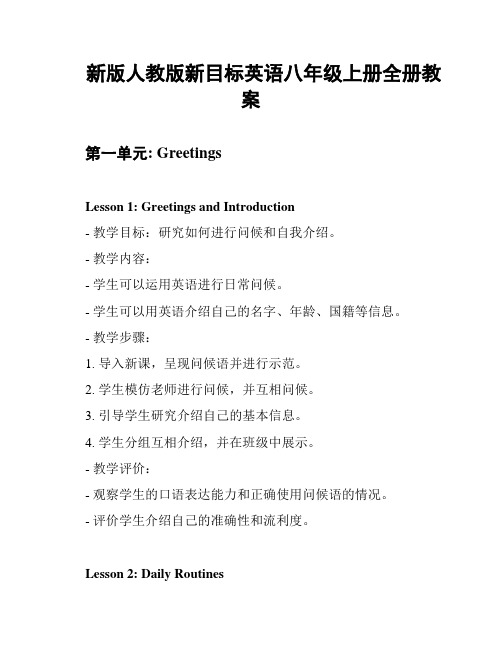
新版人教版新目标英语八年级上册全册教案第一单元: GreetingsLesson 1: Greetings and Introduction- 教学目标:研究如何进行问候和自我介绍。
- 教学内容:- 学生可以运用英语进行日常问候。
- 学生可以用英语介绍自己的名字、年龄、国籍等信息。
- 教学步骤:1. 导入新课,呈现问候语并进行示范。
2. 学生模仿老师进行问候,并互相问候。
3. 引导学生研究介绍自己的基本信息。
4. 学生分组互相介绍,并在班级中展示。
- 教学评价:- 观察学生的口语表达能力和正确使用问候语的情况。
- 评价学生介绍自己的准确性和流利度。
Lesson 2: Daily Routines- 教学目标:研究描述日常活动。
- 教学内容:- 学生能够运用英语描述自己的日常活动。
- 学生可以用英语叙述一天的活动安排。
- 教学步骤:1. 复前一课的内容,引导学生回忆日常活动的英语表达。
2. 引导学生研究新的日常活动的词汇和句型。
3. 学生分组分享自己的一天活动安排,并向全班汇报。
- 教学评价:- 观察学生对日常活动词汇和句型的掌握程度。
- 评价学生的口语表达和沟通能力。
第二单元: Hobbies and Leisure ActivitiesLesson 1: Hobbies- 教学目标:研究谈论自己的兴趣爱好。
- 教学内容:- 学生可以用英语描述自己的兴趣爱好。
- 学生可以运用所学词汇进行对话练。
- 教学步骤:1. 复前一课的词汇和句型。
2. 引导学生研究新的兴趣爱好词汇。
3. 学生分组进行对话练,谈论自己的兴趣爱好。
- 教学评价:- 观察学生对兴趣爱好词汇的掌握情况。
- 评价学生在对话练中的口语表达能力。
Lesson 2: Leisure Activities- 教学目标:研究谈论闲暇活动。
- 教学内容:- 学生能够用英语描述自己的闲暇活动。
- 学生能够与他人交流关于闲暇活动的话题。
- 教学步骤:1. 复前一课的词汇和句型。
新人教版八年级英语上册Unit8 教案

新人教版八年级英语上册Unit8 教案
一、教学目标
1. 了解并掌握本课时的生词和短语。
2. 能够听懂并正确理解本课时的听力材料。
3. 能够流利朗读课文,并理解课文的主要内容。
4. 能够灵活运用课文中的重点单词和短语进行口语交流。
5. 能够合作完成小组活动,提高团队合作意识。
二、教学重难点
1. 重点:掌握并运用本课时的重点单词和短语,能够流利朗读课文,理解所学知识。
2. 难点:理解和正确使用本课时的重点单词和短语,培养语言表达能力。
三、教学过程
1. Warming-up:
引入生词和短语,让学生猜测单词意思并集体讨论。
2. Listening:
播放录音,让学生听懂对话内容,并回答相关问题。
3. Reading:
让学生朗读课文,并根据理解回答问题。
4. Vocabulary practicing:
将生词和短语进行分类记忆,并进行一定的练和口语运用。
5. Pair working:
学生分为两人一组,进行口语对话,练所学的重点句型。
6. Group activity:
学生分为小组,进行团队活动,提高团队合作意识。
四、教学反思
本节课主要针对生词和短语进行了分类讲解,并进行了一定的练习巩固。
在教学过程中,学生积极参与,气氛活跃;但部分学生在拼写方面存在一些问题。
针对这一问题,下节课将特别强化拼写教学。
同时,在练习环节,语音跟读效果较佳,但口语表达仍需要继续加强,将加强口语训练环节,提高学生语言表达能力。
人教版八年级上册英语全册教案教学设计
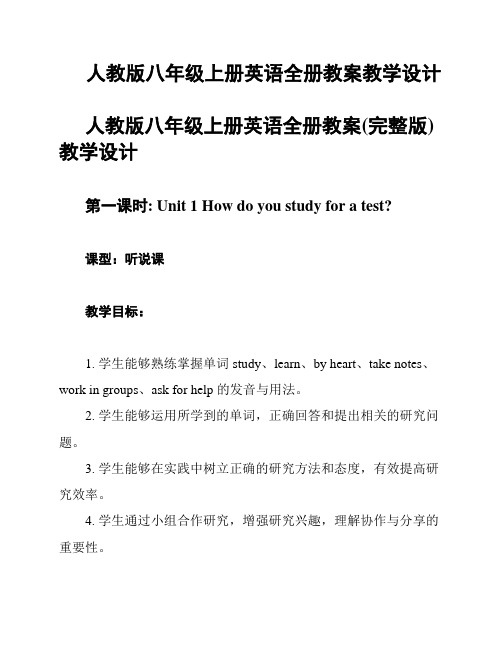
人教版八年级上册英语全册教案教学设计人教版八年级上册英语全册教案(完整版)教学设计第一课时: Unit 1 How do you study for a test?课型:听说课教学目标:1. 学生能够熟练掌握单词 study、learn、by heart、take notes、work in groups、ask for help 的发音与用法。
2. 学生能够运用所学到的单词,正确回答和提出相关的研究问题。
3. 学生能够在实践中树立正确的研究方法和态度,有效提高研究效率。
4. 学生通过小组合作研究,增强研究兴趣,理解协作与分享的重要性。
教学重点:1. 研究并正确使用新单词 study、learn、by heart、take notes、work in groups、ask for help。
2. 运用所学到的单词回答和提出相关的研究问题。
教学难点:如何正确回答和提出与研究方法相关的问题。
课前准备:1. 教师准备录音机和磁带,展示学生与研究方法相关的图片或视频。
2. 教师准备合适的研究问题,了解学生们的研究情况,并在教学中时刻引导。
教学过程:活动设置:1. Group work:学生小组内讨论,高效研究。
2. Ask for help:提醒学生们研究需要权威与有效的帮助和工具,坚持主动求助于同学、老师或专业人士。
教学反思:1. 整个课堂上,学生们在小组内积极发言,参与活动。
但是,还有一部分学生比较内向,不善于表达自己的观点。
在下一次课堂上,我们需要采取更多的积极有效的策略,包括备课、教案分析、对话等,来提升这些内向学生的参与度和积极性。
2. 整个课程,教师引导和激发学生参与学习,但在某些时刻,没有给学生足够的作用空间。
在后续的教学中,我们更加关注“引导而不是指导”这个概念。
人教版八年级上册英语全册教案

单元课题Unit 4 What’s the best movie theatre?语法归纳Unit 4教学札记形容词的比较级和最高级(二)1. 形容词的比较级和最高级的用法(1)形容词比较级用于两者(人或物)之间的比较,表示一方比另一方“更……”或“较……”,后面通常用比较连词than连接另一方所比较的人或物。
than引导的是比较状语从句,但为了避免重复,从句中有些与主句相同的部分常常省略,而把相比较的部分省略出来。
另外,在上下文明确时,形容词比较级也可以单独使用。
例如:This room is smaller than that one (is). 这个房间比那个房间小。
He is younger than I(am). 他年纪比我小。
His English is better than his brother 's (is). 他的英语比他哥哥的好。
1.形容词最高级用于三者或三者以上的人或事物之间的比较,表示其中一方在三者以上的人或事物中“最……”。
最高级前通常用定冠词the, 并用of或in短语来说明比较的范围。
Of后面一般接表示同类的名词,in接表示范围的名词。
例如:He is the tallest of all. 他是所有人中最高的。
Li Hua is the best student in his class. 李华是他班上最好的学生。
2.比较级与最高级的区别与联系(1)比较级是用来把彼此独立的适合人进行比较;最高级是把一个群体中的一员与整体进行比较,这个群体必须包括这个成员,请看下面例句:(A)Mary is taller than her two sisters. 玛丽比她的两个姐姐高。
(B)Mary is the tallest of the girls. 玛丽是这些女孩中最高的。
【注意】句(A)中玛丽是在另外两个姐妹之外,是玛丽一个人同另外两姐妹(作为一方)来比较,所以用比较级。
有关八年级英语教案人教版5篇

有关八年级英语教案人教版5篇八班级英语教案人教版精选篇1本节课讲授的内容是仁爱版教材八班级英语(上册)第三单元Topic I Section A。
这一单元描述hobbies,每个话题基本上与同学日常生活息息相关的内容。
第一话题I love collecting stamps 不单是谈论有关集邮方面的爱好,还有听音乐、做运动等。
这极大地丰富了同学们的业余生活,通过谈论彼此的爱好爱好,既学到了学问,又加深了师生之间的感情。
一、指导思想:从新课标的理念动身,贯彻面对全体同学,以同学的终身进展为本的指导思想。
对原教材内容重新加以处理。
力求对教学过程细心设计,接受任务型教学途径,全方位调动同学学习英语的乐观性,培育他们的综合语言运用力气。
二、教学目标1、学问与技能目标:①学会关于爱好、爱好方面的词汇②能够运用语言谈论自个儿及他人的爱好和爱好。
2、情感目标:有爱好听英语、讲英语、唱歌曲、做玩耍,乐于仿照,敢于开口,乐观参与,团结协作。
3、学习策略目标:能热忱地与他人合作。
共同完成学习任务;主动向老师和同学请教;留意力集中;乐观地运用所学英语进行表达和交际。
三、教学重点及难点1、教学重点:同学能够运用各种方式谈论爱好、爱好、并初步熟识感叹句2、教学难点:used to的用法四、教学过程1、课前热身,师生同唱一首歌:(调动同学的乐观性,拉近师生的距离)2、复习love,like,prefer,enjoy+v-ing结构,为新课作预备①老师简介家人的爱好爱好My sister likes dancing,but she doesn`t love singing,My brother enjoys skating.He also prefers swimming②师生对话谈论宠爱做的状况,反复应用What do you lovelikeenjoyprefer doing?巩固用法,增进师生间了解.3、导入:依照对话内容,老师表达Swimming is A’s hobby.Singing is B’s hobby. Reading is my hobby.老师拿出部分收集的邮票,边让同学看,边表达,Collecting stamps is my hobby, too. I love collecting stamps.导入Topic 1标题。
人教版英语的初二上册教学设计五篇

人教版英语的初二上册教学设计五篇现代的英语教学要求学生听说读写全面发展,而英语知识散碎性又意味着记忆的不断重复性,那么把学生抓在手中让他们跟着学,有兴趣学就变得十分重要。
下面是小编整理的人教版英语的初二上册教学设计5篇,欢迎大家阅读分享借鉴,希望大家喜欢,也希望对大家有所帮助。
人教版英语的初二上册教学设计1教学目标能听,说,读,写短语:cleaned my room, washed my clothes , stayed at home, watched TV .理解句子:How was your weekend ? It was fine ,thanks . What did you do ? I stayed at home and watched TV.能运用过去式询问别人上周末的活动,并会对其作出回答。
3. 能够运用新学的内容完成“Do a survey and report”任务。
4. 在小组的讨论交流中,培养学生英语的综合运用能力。
教学重难点1.重点:掌握核心单词、词组以及句子。
2.难点:掌握动词过去式的用法及过去式的读音。
教学过程Step1 : Warm upT: Good morning, boys and girls,.I usually clean my room and wash the clothes on weekends.What do you usually do on weekends?S1: I usually do my homework and watch TV.S2: I usually play table tennis. ………..(设计目的:问候语热身进入英语学习状态,同时用一般现在时态提问,为新课一般过去时做铺垫。
)Step2:PresentationT: Today we’ll learn Unit.2Last weekend.1. 日历呈现 Last weekend(设计目的:直观导入过去时间,上周六和上个星期天。
人教版八年级上册英语全册教案

【能力目标】能够使用skimming和scanning阅读技巧找出文章的主要内容,并完成任务。
【情感目标】培养学生的阅读能力和语言表达能力,陶冶情操。
教学一般过去时态的各种句式。
重难点教学过程◆Step 1Leading inT:Good morning,class.Today we will learn Section B(1a-2e).First,let’s review what we learnedyesterday.Now let’s have a free talk.教学过程T:Where did you go on vacation?S:I went to summer camp.T:Did you do anything special there?S:Yes,I...T:Did you buy anything for your parents or friends?S:Yes,I bought...for.../No,I bought nothing.T:How was/were...?S:It was/They were...设计意图让学生做到温故知新。
◆Step 21a1.Look at the six pictures.2.Match the words with the pictures.3.Students complete the task in 1b individually.4.Check the answers.(见课件)◆Step 31bNow class,look at the words in 1a again.Which words do you think describe good things and which ones not.Let’s have a try.Try to write words on the left.Write words on the right.Check the answers.(见课件)◆Step 4 1c & 1d1.Ask students to scan the questions in 1c.2.Play the recording for the first time.And say:Listen to the tape.Lisa is talking about her plete the four questions.Unit 3 I’m more outgoing than my sister.Unit 4What’s the best movie theater?。
2024年人教版八年级英语上册教案全册完整版

2024年人教版八年级英语上册教案全册完整版一、教学内容Unit 1 Where did you go on vacation?Unit 2 How often do you exercise?Unit 3 I'm more outgoing than my sister.Unit 4 What's the best movie theater?Unit 5 Do you want to watch a game show?二、教学目标1. 掌握并运用一般过去时、频率副词、形容词比较级和最高级等语法知识。
2. 提高学生的听说读写能力,尤其是日常对话和描述性句型的运用。
3. 培养学生的团队合作精神和批判性思维。
三、教学难点与重点1. 教学难点:一般过去时与频率副词的运用,形容词比较级和最高级的区分。
2. 教学重点:日常对话的听说读写能力,描述性句型的构建。
四、教具与学具准备1. 教具:PPT、录音机、黑板、教学卡片。
2. 学具:课本、练习本、彩笔。
五、教学过程1. 导入:通过展示学生感兴趣的旅游景点或活动图片,引发学生对Unit 1话题的兴趣。
2. 新课内容展示:讲解一般过去时,举例说明,引导学生进行对话练习。
3. 例题讲解:针对Unit 1的语法点,给出例题,并讲解解题过程。
4. 随堂练习:分组练习,让学生相互提问并回答假期经历。
6. 课堂延伸:以类似方式教授Units 25,注意结合各单元特点进行教学。
六、板书设计1. 板书八年级英语上册教案2. 板书内容:Unit 1: 一般过去时,频率副词Unit 2: 形容词比较级Unit 3: 形容词最高级Unit 4: 描述性句型Unit 5: 日常对话七、作业设计1. 作业题目:Write a short passage about your last vacation using the simple past tense.Compare two movie theaters in your city and explain which one is better.Make a survey about how often your classmates exercise and present the results.2. 答案:见附件。
新人教版八年级上册英语教案(全册)

新人教版八年级上册英语教案(全册) Unit 1 School lifeLesson 1 Where's the post office?Teaching objectives- Learn and master the new words: post office, bookstore, hotel, cinema, restaurant- Learn and master the new sentence pattern: Where is the post office?- Train the students' listening and speaking ability.Key points and difficult points- Key points: The usage of new words and sentence pattern.Teaching methods- Demonstration method.- Task-based language teaching method.Teaching aids- Multimedia courseware.Teaching procedures1. Warm-up.2. New lesson.3. Listening practice.4. Speaking practice.5. Summary and homework.Unit 2 Personal informationLesson 1 My name's Gina.Teaching objectives- Learn and master the new words: name, family name, given name, spell- Learn and master the new sentence pattern: What's your name? My name is Gina.- Train the students' listening and speaking ability.Key points and difficult points- Key points: The usage of new words and sentence pattern.Teaching methods- Situational method.- Task-based language teaching method.Teaching aids- Multimedia courseware.Teaching procedures1. Warm-up.2. New lesson.3. Listening practice.4. Speaking practice.5. Summary and homework.Lesson 2 Where are they from?Teaching objectives- Learn and master the new words: country, Australia, England, China- Learn and master the new sentence pattern: Where are you from? I'm from Australia.- Train the students' listening and speaking ability.Key points and difficult points- Key points: The usage of new words and sentence pattern.- Difficult points: How to ask and answer questions about where people are from.Teaching methods- Situational method.- Task-based language teaching method.Teaching aids- Multimedia courseware.Teaching procedures1. Warm-up.2. New lesson.3. Listening practice.4. Speaking practice.5. Summary and homework. ......。
八年级上册英语教案人教版5篇
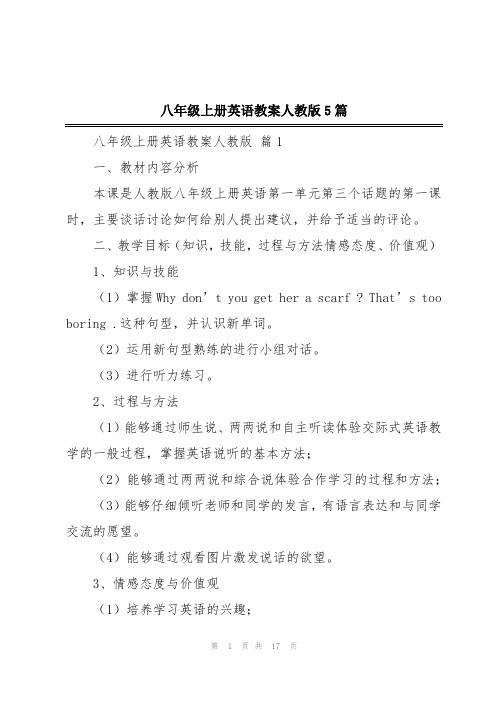
八年级上册英语教案人教版5篇八年级上册英语教案人教版篇1一、教材内容分析本课是人教版八年级上册英语第一单元第三个话题的第一课时,主要谈话讨论如何给别人提出建议,并给予适当的评论。
二、教学目标(知识,技能,过程与方法情感态度、价值观)1、知识与技能(1)掌握Why don’t you get her a scarf ? That’s too boring .这种句型,并认识新单词。
(2)运用新句型熟练的进行小组对话。
(3)进行听力练习。
2、过程与方法(1)能够通过师生说、两两说和自主听读体验交际式英语教学的一般过程,掌握英语说听的基本方法;(2)能够通过两两说和综合说体验合作学习的过程和方法;(3)能够仔细倾听老师和同学的发言,有语言表达和与同学交流的愿望。
(4)能够通过观看图片激发说话的欲望。
3、情感态度与价值观(1)培养学习英语的兴趣;(2)在学生两两交流和小组合作交流中,培养孩子合作意识和合作精神,能够相互配合完成一段通顺流畅的说话训练;(3)使学生学会礼貌待人。
三、学习者特征分析1、学生是八年级的学生。
2、学生已经学习了camera、hat,flowers 等物品的词。
3、学生对 great,interesting,boring 这些评论性的词非常熟悉。
4、学生好奇心强,对送什么礼物很感兴趣。
5、学生善于表现自己,乐于交际。
6、学生的听力能力不够强。
四、教学策略选择与设计1、谈话策略:运用谈话法引入新课。
2、自主听读策略:学生通过自主听读拓展材料,在完成课标要求的基础上训练听说能力,积累和丰富英语词汇和句式。
3、角色扮演法:让学生通过扮演不同角色,小组对话练习熟练地掌握重点句型。
五、教学环境及资源准备1多媒体教室。
2 本课教材,课件。
六、教学过程教学过程教师活动学生活动设计意图及资源准备Step1: Greeting Hello , cliass! How are you! Are you happy ... Greeting. 拉近教师和学生的距离。
八年级英语教案 八年级英语上册教案优秀8篇

八年级英语教案八年级英语上册教案优秀8篇教学是一种创造性劳动。
写一份优秀教案是设计者教育思想、智慧、动机、经验、个性和教学艺术性的综合体现。
下面是可爱的小编午夜为大家收集整理的8篇八年级英语教案的相关范文。
八年级英语教学设计篇一一、说教材1、教材内容及地位本节课的主要内容是新目标英语八年级上册第2单元一课时,教材是以What’s the matter ?为中心话题,描述身体不适和提出建议展开,学习和运用“What’s the matter ?”和“What should…do?”让学生学会描述身体的不适和提出建议,本课教材内容与学生的实际生活密切相关,易于引出学生运用简单的英语进行交际和交流,在学习活动中,学生通过交换对身体不适的描述及建议,促进学生之间和师生之间的情感交流,增进情谊。
一课时主要学习的内容是学习有关身体部位的单词,学习“What’s the matter ?”和“What should …do?”句型。
2、说教学目标知识目标:学习掌握有关身体的词汇以及有关疾病的词汇,并学会描述身体的不适和提出建议。
能力目标:听懂本课学习活动中的问题及回答,能在本课的任务型活动中进行简单的交流,能正确朗读本的对和句型,能写出本课的单词和句型。
情感目标:通过描述自己的身体的不适提出建议,表达自己的看法,使学生在人际交往中学会关心别人,增进情谊。
文化意识目标:用恰当的方式表达自己的看法,增进人际交往中学会关心别人的能力,了解英美国家询问和表达身体不适的习惯,培养世界意识。
3、说教学重难点重点:本节课主要学习身体部位的单词和一些疾病的词汇,以及身体不适的表达及建议。
难点:身体不适的表达及建议二、说学情初二年级的学生对英语已经有了一定的基础,但本地区部分学生对学习英语的兴趣不是很浓,在学习中,他们更喜欢从游戏中或活动中学习,这样更能提高他们的学习兴趣,让他们更轻松地掌握英语知识。
三、说教法作为教学的引导着,我遵循新课程“学生是学习的主人,一切的教学活动设计在以学生为本”的教学理念,坚持“为学生的发展,须培养学生的自主性、能动性、独立性和创造性”的教学原则。
人教版八年级英语上册-Unit2-教案
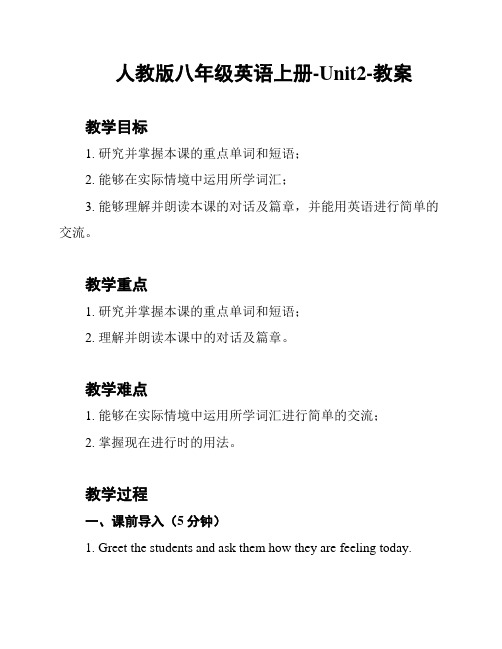
人教版八年级英语上册-Unit2-教案教学目标1. 研究并掌握本课的重点单词和短语;2. 能够在实际情境中运用所学词汇;3. 能够理解并朗读本课的对话及篇章,并能用英语进行简单的交流。
教学重点1. 研究并掌握本课的重点单词和短语;2. 理解并朗读本课中的对话及篇章。
教学难点1. 能够在实际情境中运用所学词汇进行简单的交流;2. 掌握现在进行时的用法。
教学过程一、课前导入(5分钟)1. Greet the students and ask them how they are feeling today.2. Show some pictures on the screen and try to ask them what the pictures are about.二、自主研究(35分钟)1. 学生们自主研究课文,并做好笔记,记录不熟悉的内容和需要了解的疑点。
2. 学生们可以在自主研究的过程中互相讨论并互相帮助。
三、交流展示(15分钟)1. 当做完自主研究后,老师开始组织学生展示他们的研究成果,展示方式并不限定,有朗读、问答等,总之要把研究到的知识用出来,让知识得到巩固。
2. 学生们可以相互交换信息或者反馈,梳理研究内容,发现问题。
四、课堂总结(5分钟)1. 了解本节课的教学内容,培养学生研究语言的兴趣。
2. 学生们要及时复和总结,才能让这些知识真正掌握。
教学板书设计1. 本课的重点单词和短语。
2. Was he doing exercise? Yes, he was.课后作业1. 完成本课课后的题。
2. 总结课上学到的内容。
人教版英语八年级上全册精品教案【全套】

备课本人教版八年级上册英语全册教案班级______教师______日期______人教八英语八年级上册教学计划一、指导思想以“英语课程标准”为宗旨,适应新课程改革的需要,面向全体学生,提高学生的人文素养,增强实践能力和创新精神。
正确把握英语学科特点,积极倡导合作探究的学习方式。
培养学生积极地情感态度和正确的人生价值观,提高学生综合素质为学生全面发展和终身发展奠定基础。
二、学生基本情况分析:大多数学生已能听懂有关熟悉话题的语段和简短的故事。
能与教师或同学就熟悉的话题交换信息。
能读懂短篇故事,能写便条和简单的书信。
但由于各种因素的影响,学生发展参差不齐。
有少数学生因为基础不够好,学习很吃力而自暴自弃,有的因此扰乱课堂次序,这给教学带来不少困难。
十来个学生根本没有学习目标,完全放弃学习,但学生的纪律总体还是不错,这样为学生的学习打下良好的基础。
另外,学生在情感态度学习策略方面还存在诸多需要进一步解决的问题。
例如:很多学生不能明确学习英语的目的,没有真正认识到学习英语的目的在于交流;有些同学在学习中缺乏小组合作意识;大多数同学没有养成良好的学习习惯,不能做好课前预习、课后复习,学习没有计划性和策略性;不善于发现和总结语言规律,不留意知识的巩固和积累。
三、教材分析人教版《新目标英语》八年级(上册),本套八年级教材共分十个单元,每单元分Section A和Section B以及Self-check三部分。
Section A : 1a呈现本单元的重点单词,语法结构与功能;1b呈现任务型听力练习;1c结对练习核心对话;2a,2b是多种听力练习;2c呈现不同的任务。
Grammar Focus 呈现语法功能重点;3a-3c提供多种课堂活动。
Section B: 1a词会扩展;1b新旧知识综合运用,同时在原有基础上有所扩展;2a,2b为听力练习;3a-4提供各类练习形式,随着所学内容的加深,逐步扩展成阅读和写作练习。
八年级英语上册全册教案(人教版)
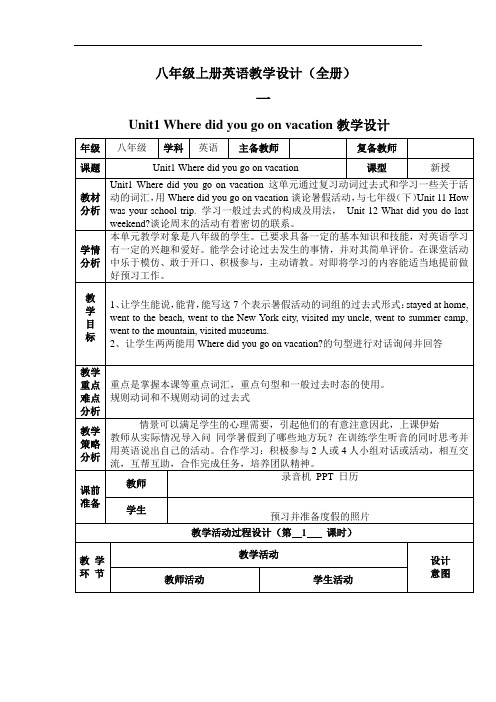
八年级上册英语教学设计(全册)一Unit1 Where did you go on vacation教学设计Unit 2 How often do you exercise?教学设计(单元教案)Unit3 I’m more outgoing than my sister单元教案Step 3. Section B1aStep 4. Gro upw orkStep 5. Listen ing. T: All of you have good friends,right? Well , Can you tell me thesame and di fference betweenyou and your friends?S1: He is quiter than me.S2: We are both tall.S3: Her hair is longer than mine.T: Great! And what do you thinkthe most important things are tobe your friends?Statements your friends usingthe phrases in 1a.In this activity, first ask thestudents to look at the names andthe first column of the table.Tell students they will hear abinterviewer talking to Molly andMary. They are t alking about whatthey like about their best friends.SpeakingGroupworkListening主题内容。
小组操练,培养集体协作能力。
以便学生能抓住其精髓。
教学环节教学活动设计意图教师活动学生活动Step6 Discussion Step 7. Home work 1 Who would you like to makefriends with? (Ron, Hermoine,or Harry Porter) Why?2 Introduce your new friend to usWrite five statements about w hatis important in a friend.Discussion本部分的讨论活动是对前面片段的总结, 主要目的是激发学生用所学的句子结构发表自己的意见板书设计Unit3 I’m more outgoing than my sister..has cool clothesis popular in school.likes to do the same things as me. ( has the same interests)is good at sports ( athletic)is good at schoolwork.makes me laugh. ( funny)教学反思英语教学提倡体验、实践、参与、交流与合作的学习方式,要使学生尽可能亲身感受和直接体验语言A goodfriend。
- 1、下载文档前请自行甄别文档内容的完整性,平台不提供额外的编辑、内容补充、找答案等附加服务。
- 2、"仅部分预览"的文档,不可在线预览部分如存在完整性等问题,可反馈申请退款(可完整预览的文档不适用该条件!)。
- 3、如文档侵犯您的权益,请联系客服反馈,我们会尽快为您处理(人工客服工作时间:9:00-18:30)。
人教版八年级英语上册教案:Unit5 Can you cometo my birthday party ?2011-10-05 09:50:20 来源:评论:0点击:346Unit5 Can you come to my birthday party ?SectionA一、教师寄语:God helps those who help themselves.二、学习目标:Knowledge aims: 1) words and phrases :lesson,another,concert,whom,weekday,study for a test,havea(n)……lesson,have to,another time,go to the doctor.2) Important sentences: —Can you come to my birthday party?—Sure, I’d love to./ I’m sorry, I have to……Ability aims: 1)学会发出、接受和拒绝邀请。
2)掌握如何表达义务。
Emotion aim:学会邀请他人和接受或拒绝他人的邀请,增进与他人之间的情感,培养交往能力。
三、教学重难点:1)熟练掌握情态动词Can 的用法2)准确表达邀请别人,接受和拒绝别人的邀请。
四、学习过程:(一)预习导学课程____2.又一个_____3.音乐会______4.为考试而学习______5.去看病_____6.上钢琴课______7.帮助我的父母_______8.拜访我的姑姑_______(二)自主学习。
Listening and writing.(Finish1b,2a and 2b)Check the answers in groups. Then complete the test below.A. 英汉互译。
1.another time________2. 谢谢你的邀请___________3.goto the guitar lessons ___________4.太多作业___________5.go to the concert________6. 棒球比赛_______B.用所给单词的适当形式填空。
1.Thanks for_______(ask).2. I’m sorry. I have to ______(go) to my piano lesson.3. —Can she _____(go) to the movies? —No. she can’t .She ______(play) soc cer.4. I’d love _____(come) to your birthday party tomorrow.5.—Can they go to the concert? —No, they _____. They ______(go) to the party. (三)合作探究1.Practice the conversation like 2c.2.Finish 3a first and then make a birthday card like 3a.(四)拓展创新Look at your birthday card , practice the conversation like the following:A: Hey, Simon, can you come to the partyB: When is it?A: It’s Friday, June 30, at four thirty.B: Great! I’d love to.(五)梳理归纳What have you learned in this class? Please write them down:________________________________________________________________________ _(六)达标检测一、单项选择。
1.—Happy birthday! —____________.A. ThanksB.The same to youC. I do tooD. Not at all2.You can’t find him. He usually _____ at 4:00.A. have an English lessonB. is having an English lessonC. will go to the guitar lessonD. goes to the guitar lesson3. —What are you going to do this weekend? —I’d like _____my parents.A.to visit B.visit C.visiting D. visit4.—She has a headache.She can’t attend the meeting. —______.A.It doesn’t matter B.It sounds wonderful C.I’m sorry to hear that D. really 5.—I’m sorry,I can’t go to the movies with you.—Oh,that’s too bad.Maybe _____ time.A.the other B.other C.another D. others6.—Can you go to the science museum with me tomorrow?—_______,but I have to study for my chemistry test.A.I'd love to B.Never mind C.It’s nothing D. Yes, please7. He ______ stay at home, because his mother was ill.A. has toB. have toC. hadD. had to二、词汇A.根据首字母提示填空。
1. My American friend is going to v_____ me next week.2. Hey! Can you come to my b______ party?3. Don’t talk in class, please keep q______.4.For w_____ are you waiting?5. I’m sorry, I can’t come, I have to s________ for the m ath test.B.用所给词的适当形式填空。
1. Can you __________(come) to my house for dinner? Sorry, I can’t .2.Thanks for __________ (ask) me to your birthday party.3.He’s trying _________(go) out, please _________(help) him _________(open) the door.4.Do you want_______(go)_______(swim) with us Saturday afternoon?5. Would you like ______(come) to my office ______(discuss) the report?三、按要求完成句子,每空一词1. He has to go to his guitar lesson.(改为一般疑问句)_____ he ______ to go to his guitar lesson?2. He has to help his parents at home on Saturday.(改为否定句)He_____ ______ _____ ______his parents at home on Saturday.3.I am studying fora test.(对划线部分提问)____ ____you studying for?五、典型例题解析:1. The shoes are too big, So I’d like to try _____pair.A. otherB. the otherC. anotherD. the others.解析:答案:C 。
another 在此泛指“另一双”.2. —Could I borrow your dictionary? —Of course you_____.A. canB. mustC. shouldD. will解析:答案:A. can 最符合题意。
“当然你能。
”3.—Can you finish your homework before dark? —_______.A. No problem.B. That’s OK.C. Never mindD. With pleasure.解析:A, 没问题;B, 不客气;C; 不介意;D,很愿意。
问句句意为:“天黑前你能完成你的作业吗?”故只有A符合题意。
故选A.六、中考链接:1.Chinese climbers carried the Olympic Flame to the top of the world’s highest mountain______8th of May 2008.(2008,苏州)A. onB. atC. inD. from2. —Ben, would you like to play football with us?— _____,but I have to wash the dishes first.(2008,重庆)A. No, I can’tB. I don’t want toC. Yes, please.D. I’d love to.3.Great changes have taken place in China, who can tell ______it would be like in ______five years?(2008,青岛)A. how;otherB. what;moreC. how;anotherD. What;another七、课后反思:这节课我学会了我的困惑是Unit5 Can you come to my birthday party ?Section B一、教师寄语:.Do nothing by halves. (凡事不可半途而废。
